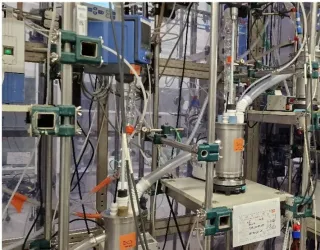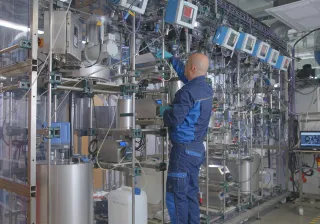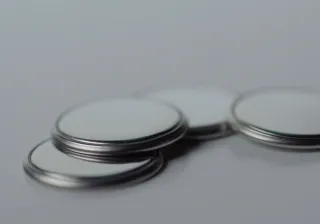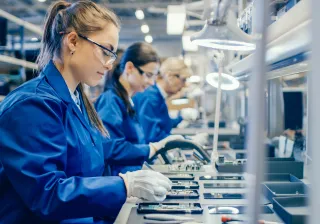The Aalto-led collaboration between researchers and industry resulted in impressive research outputs, boosting technological development related to lithium-ion battery metals and materials mining, refining and recycling. VTT had a role in researching and developing solutions for secondary raw material streams, such as batteries and circularity methodologies.
BATCircle2.0 –– a key project in Business Finland’s Smart Mobility and Batteries from Finland program –– came to a successful conclusion in the end of August 2024. Over three years, the project resulted in a substantial level of R&D activities in companies and academia, as well as published research including over 80 peer-reviewed journal papers, more than 25 conference presentations, over 45 theses (doctoral, master’s and bachelor’s) and over 30 public reports.
In 2021, Business Finland granted 10.8 million euros as part of a total funding budget of almost 20 million for BATCircle2.0, a sequel of the original BATCircle (2019-2021). During the last three years, BATCircle2.0 has united the research interests and strengths of 15 companies and six research organizations based in Finland. In addition, the international Advisory Board expanded the impact at European and global level. The research ecosystem was led by Aalto University and the success of this industry-academia project builds strongly on the principles of communication, collaboration and knowledge exchange.
“At VTT, the project has allowed us to work with our stakeholders in studying new secondary raw material feeds and researching new sustainable solutions for them. The project covered a vital junction of not only recycling and life-cycle assessment, but also processing of secondary raw materials containing battery-related elements from different sources,” says Research Team Leader Antti Porvali.
The co-innovative research of BATCircle2.0 was conducted both as open research –– completed at the research centers and Universities –– as well as in the company specific R&D research projects. The common goal was to create new knowledge and innovations for future business opportunities in the field.
In parallel, international collaboration was strengthened via several applied and granted Horizon Europe projects, e.g. METALLICO, LITHOS, SCRREEN3. VTT has also collaborated with the Batteries European Partnership Association (BEPA). The joint research activities have further strengthened the collaboration between companies and research organizations, thereby supporting the Finnish National Battery Strategy 2025 in the work promoting Finland’s competitiveness throughout the battery sector. Finland is among the global leaders in the Li-ion battery value chain, as reflected by Bloomberg’s recent ranking.
Overall, it is important to create a European-wide battery industry which utilizes the enormous business potential of LIBs throughout the whole value chain from mining to recycling. Since Europe is currently highly dependent on the supply of both raw materials and battery cells from overseas, the self-sufficiency of battery sector is one of the major objectives. These targets coincide with the new EU Batteries Regulation (adopted in 2023), which will be introduced gradually from 2025 onwards.
“Despite the recent slowdown, the future of European battery sector continues looking promising,” says Jyrki Alkio, Chief Specialist at Ministry of Economic Affairs and Employment of Finland.
“This project has allowed VTT to work and collaborate with our partners on important topics related to field of metallurgical processing of minerals and materials of batteries, life-cycle assessment and material characterization, strengthening our core competencies in this growing field and our related research service offering,” Porvali continues.
The consortium produced extensive research results that can enhance the efficiency of the refining processes and recycling of lithium-ion battery raw materials. Furthermore, the production processes of battery materials were improved, and the properties of new battery active materials developed. Additionally, the project generated outcomes to support exploration of battery mineral deposits in Finland and investigated opportunities for more sustainable exploitation.
“VTT stands ready to support our partners and companies in this field of extractive metallurgy, battery technologies and industrial circular economy, and in their cross-disciplinary themes. For example, during the project the competences and methods for dynamic battery material flowanalysis (dMFA) were developed and the integration of environmental impacts to dMFA were advanced. We also worked with material characterization and processing, from laboratory experiments to bench-scale piloting in the project,” says Porvali.
The BATCircle2.0 research ecosystem participants aims to continue the ambitious research and development work also in the future, while promoting Finland's position as a world leader in the lithium-ion battery supply chain.
BATCircle2.0 consortium partners:
- Aalto University, University of Eastern Finland, LUT University, University of Oulu
- Geological Survey of Finland (GTK), VTT Technical Research Centre of Finland
- Boliden Harjavalta Oy, Finnish Minerals Group Oy, Fortum Battery Recycling Oy, Metso Finland Oy, Norilsk Nickel Harjavalta Oy, Terrafame Oy, Umicore Battery Materials Finland Oy, AkkuSer Oy, BroadBit Batteries Oy, Grafintec Oy, FinnCobalt Oy, Keliber Technology Oy, Latitude 66 Cobalt Oy, Mawson Oy, X-Ray Mineral Services Finland Oy

Further information:
Antti Porvali, Research Team Leader, Project Manager, VTT
Tuomas van der Meer, Research Team Leader, Principal Investigator, VTT
More information about the topic:
National Battery Strategy 2025





